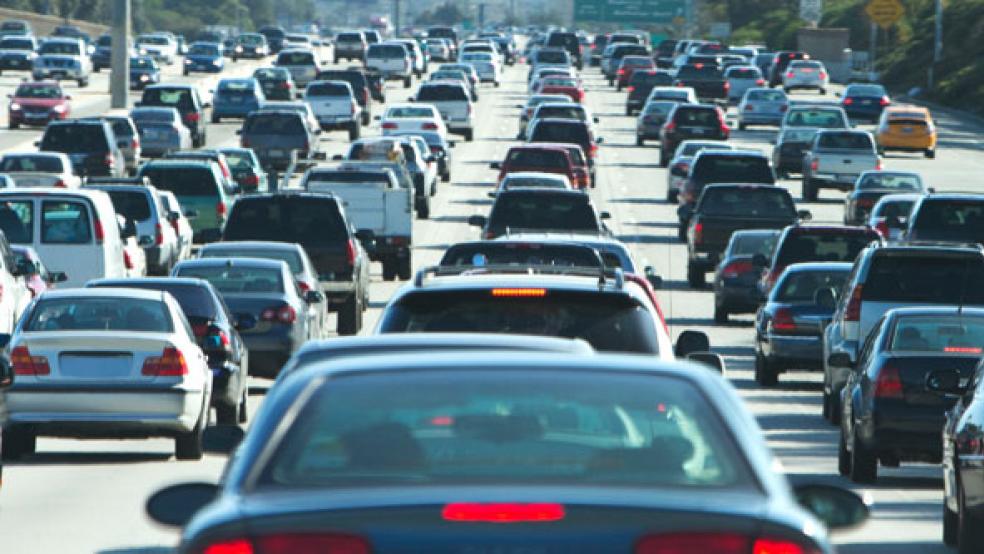Just as the job market appears to be picking up steam again, congressional gridlock over new highway, bridge and infrastructure funding legislation could seriously dampen the economic recovery, economists and transportation experts are warning.
Last Friday, the stock market soared on news that the labor market had snapped out of its winter lethargy and added 223,000 jobs in April, while the unemployment rate dipped to 5.4 percent — its lowest level since mid-2008. But uncertainty about the fate of federal surface transportation funding in the face of a May 31 deadline for action has forced many state officials to place new projects on hold and could undercut the happy economic narrative.
Related: Congress Likely to Kick the Can Down America’s Potholed Road
“With continued uncertainty at the federal level, many states and localities are delaying construction projects and remain trapped in a cycle of deferred maintenance that hurts thousands of employers and workers alike,” wrote Joseph Kane and Robert Puentes, senior fellows at the Brookings Institution, in a revealing new analysis.
The importance of infrastructure spending to the economy is well documented. Some economists say that every $1 billion of new highway spending can directly and indirectly create up to 13,000 jobs a year. Many of these jobs — such as civilian engineers, construction workers and laborers, electricians, truck and tractor drivers, concrete mixers and plumbers — represent long-term and well-paid employment for both college and high school trained workers.
Roughly 14.5 million workers — or 11 percent of the U.S. workforce — were employed in infrastructure-related jobs in 2013, according to U.S. Bureau of Labor Statistics data. Far more workers were employed in infrastructure construction than, say, in education (12.7 million), manufacturing (12 million) and professional scientific services (8 million).
Yet federal spending on highway and bridge projects has remained static in recent years at roughly $50 billion annually, even at a time of historically low interest rates that ought to be prompting massive borrowing to fund long-delayed infrastructure improvements. With less than a month before temporary funding runs out for the federal Highway Trust Fund, Congress is nowhere close to a multi-year deal to provide increased funding and stability to the nation’s highway, bridge and transit systems.
Related: The U.S. Still Won’t Invest In 21st Century Infrastructure
Congress and the White House have their hands full on other tough issues, including fast-track Trans-Pacific Partnership trade legislation and a nuclear non-proliferation agreement with Iran. But experts warn that policymakers could be short-changing the economic recovery just when it finally appears to be hitting its stride.
“The fact that one out of every 10 workers nationally is employed in an infrastructure job shows this is much more than just short-term construction,” Kane said in an interview Monday. He added that unless Congress and the White House can reach an accord on a new multi-year highway and infrastructure spending bill that transcends the current stagnant funding policies, the economic recovery could begin to stall out again.
“I think infrastructure is vital to not just long-term economic growth but long-term economic opportunity,” he said. “It’s vital to move our goods, it’s vital to move passengers efficiently, which is vital to businesses across the country. But then it’s also a critical outlet for millions of workers when it comes to actually gaining a foothold in the job recovery.”
Related: Governors Join Obama in Infrastructure Spending Plea
Business leaders, labor groups, lawmakers and other policy makers are meeting over the coming days as part of “Infrastructure Week” to highlight the funding crisis and urge Congress to act.
Until now, Congress and the White House have settled for short-term action and spending patches to repeatedly address the threat of the Highway Trust Fund going bankrupt. Last summer, when the fund once again faced insolvency because of slumping federal gas tax revenues, Congress stepped in and transferred $10.8 billion from the general fund to keep the highway fund from going bankrupt.
Short of a last-minute turnabout, Congress is likely to pass another temporary extension to keep the highway program going at its current levels — a status quo action that would spare the states a financial crisis in the midst of the construction season but would do nothing to boost the economy.
Top Reads From The Fiscal Times:





